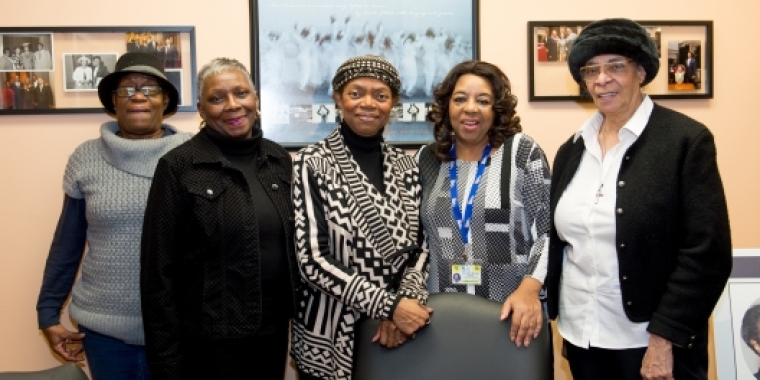
Cumberland Diagnostic & Treatment Center's Auxiliary Board Members meet with Senator Montgomery to discuss funding for NYC's public hospitals
Senator Velmanette Montgomery
February 13, 2018

Members of Cumberland Diagnostic & Treatment Center's Auxiliary Board meet with Senator Montgomery to discuss funding for public hospitals and health initiatives. Cumberland is located at 100 North Portland Avenue in Brooklyn.
Governor Cuomo's 2018-2019 proposed budget:
- Increases Department of Health funding by $5.6 billion, including a 2.5% increase in Medicaid and a 3.2% increase in the Medicaid Global Gap
- Establishes a $1 billion healthcare shortfall fund to address loss of federal funding (including elimination of CHIP), paid for by converting health insurers to for-profit status, taxing insurance windfall profits, and various state savings
Appropriations
- Medicaid: The Executive Budget provides $70.1 billion for the New York State Medicaid Program. These funds are expected to provide services for approximately 6 million individuals.
- Health Care Reform Act: The Executive Budget establishes the Healthcare Shortfall Fund and provides $1 billion in appropriation authority. This reserve account would be funded through insurance conversion proceeds.
- Minimum Wage: The Executive Budget includes $703 million in new funding to support the direct cost of FY 19 minimum wage increases for health care workers that provide services reimbursed by Medicaid on behalf of the Department of Health.
- Life Sciences Laboratory Public Health Initiative: The Executive Budget provides $600 million and continues support for a life sciences laboratory, which will develop life science research, innovation and infrastructure through a joint effort between Empire State Development and the Department of Health.
- Mental Hygiene: The Executive Budget includes $120 million for increased respite services, additional employment and day program opportunities and additional independent and certified residential services. The Executive also continues to support the transition from institutional types of care to community-based services including housing programs and additional supportive housing beds. The Executive also proposes a jail based restoration program.
Article VII
- Retail Practices: The Executive Budget authorizes the establishment of “retail practices” that would provide limited health services and treatments within the main premises of the retail businesses (such as a CVS).
- CHIP: The Executive Budget authorizes the State to make changes to the Child Health Plus (CHP) program if Congress reduces funding for CHP on or after October 1, 2017. DOB and DOH must identify the amount of federal funding that has been withheld and make any programmatic changes that may be necessary to address the loss of funding.
- Reduce the Risk of Exposure To Lead Paint: The Executive Budget requires municipalities to report lead inspection and remediations to the Department of Health and requires local code enforcement officers to conduct regular inspections of residential and non-residential properties for risk of lead paint exposure.
- Capital Support for Healthcare Transformation: The Executive Budget establishes a third round of funding ($425 million) for the Health Care Facility Transformation Program to support capital projects, debt retirement, working capital and other noncapital projects that lead to the transformation of the healthcare system.
- Opioid Epidemic Surcharge: The Executive Budget establishes a surcharge of 2 cents per morphine milligram equivalent sold. This revenue will be directed to a newly created opioid prevention, treatment and recovery account.
To learn more about the Governor's budget, download the Senate Democratic Conference Staff Budget Analysis and Superhighlights Analysis.
Share this Article or Press Release
Newsroom
Go to NewsroomLawmakers on the Move
November 14, 2019
New York Expands Eligibility for Kin Who Want to Foster Children
November 14, 2019